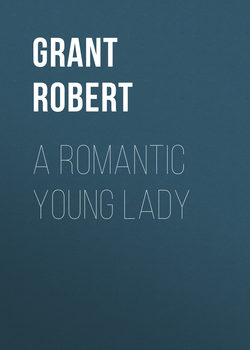Читать книгу A Romantic Young Lady - Грант Роберт - Страница 1
BOOK I.
INNOCENCE
I
ОглавлениеMy mother died in giving me birth. My father was a very rich man, a railway magnate, so called, absorbed in great business enterprises. Thus it happened that I was brought up between two fires, – my father's sister, Aunt Agnes; and my mother's sister, Aunt Helen.
Aunt Agnes was prim but cultivated. She wrote for reviews and wore eye-glasses, and her library table was habitually littered with pamphlets and tomes. On the other hand, Aunt Helen was a neat, dapper little woman, who lived in a gem of a house and delighted in bric-à-brac and entertaining. They were both spinsters. Each of them passed one evening in every week with me. On Tuesdays I dined with Aunt Agnes, and on Fridays with Aunt Helen. Thus I was alone only two evenings out of seven, for on Sundays my father did not go to the Club.
From the age of ten until I was fifteen I attended a private school. I proved ambitious and quick at my books. Aunt Helen was anxious that I should be well grounded in the modern languages, while Aunt Agnes wished me to pursue what she styled "serious" studies. In my efforts to please them both I broke down in health. My father was the first to observe my pallid cheeks, and at the advice of a physician I was taken away from school. For nearly a year I was idle, save that I read at random in my father's library. Then my aunts for once put their heads together and insisted upon my having a governess. They told my father that the next three years were the most important in my life, and that the best way to foster my health was to find some judicious person to be my companion.
Aunt Helen was in favor of one who had youth and good spirits, but Aunt Agnes thought it important that a governess should inspire respect. I was not consulted, and my father declined to arbitrate between them. In the end, the favorite of Aunt Agnes was installed, through the chance discovery that the other applicant had been at one time on the stage.
Miss Jenks was a kind but sober disciplinarian of fifty. I was her pupil until I was eighteen; and though I was none the less lonely because of her companionship, I am in her debt to-day for the pains she took to systematize my heterogeneous acquirements and teach me the evils of superficiality. Her views of life were autumnal in tint, and her laugh was never hearty. She rarely conversed with me at length; but if I made inquiries concerning any matter of knowledge, I was sure to find a book or pamphlet on my desk the next day, with slips marking the valuable pages. She kept me so steadily employed during the hours I was not in bed or in the fresh air that I had no time for novel-reading, – a pastime I had indulged in formerly to a considerable extent. I thrived physically under this regimen, but I became silent and grave. Miss Jenks seemed constantly on her guard against undue enthusiasm, and abetted by her example I inclined to introspection and over conscientiousness. I picked up pins, and went out of my way to kick orange-peel from the sidewalk, on principle.
But apart from, or rather concurrent with, this sobriety of character I was a dreamer in secret, and delighted to give the rein to fancy. I liked to picture myself in some of the romantic situations of which I had read, and to build castles for the future. But all these imaginations were of a realistic order, as distinguished from ghosts and fairies and other creations of that class. I was completely free from superstitions. It was not for luck that I picked up pins, but that they should not be wasted. In like manner I never hesitated to let a horse-shoe lie in the road, to walk under a ladder, or be one of thirteen at table. And yet I was distinctly a dreamer. If it was in the way of lovers, my thoughts were entirely subjective. I knew no young men except the boys at dancing-school; and they as a rule avoided me, for I was shy, and for the present only moderately pretty. I think I tried in my day-dreams to form an ideal of what a lover's mental and moral attributes should be without ever endowing the abstraction with a head. I found a happiness in doing so much, – akin, I fancy, to that of the votary who kneels before a shrine of which the doors are closed. It was the consciousness of a great possible happiness that thrilled me, rather than any definite vision.
When Miss Jenks left us I was a well educated girl for my age. What I knew I knew thoroughly, and the wishes of both my aunts had been respected. Perhaps the most striking circumstances connected with my bringing up, however, were that at eighteen I had no idea I was the heiress to an enormous fortune, and that I could pass young men in the street without self-consciousness. Strangely, too, I had grown up without having formed an intimacy with any girls of my own age. I have never quite been able to decide whether the ability I thus acquired to think for and by myself was more valuable than the happiness that results from such friendships; yet I have never distinctly regretted not having made a confidant among my contemporaries.
